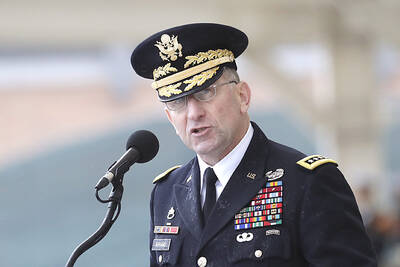Annette Lu(
At a press conference yesterday, Deputy Secretary-General of the Presidential Office Eugene Chien (簡又新) stressed that Lu was the first female winner of the prize.
Lester Wolff, former chairman of the US House Asian Affairs Committee, is the chief judge of the awarding council. Wolff said that a seven-member delegation, including Han Min-su, the council's founder, will fly to Taipei and present the award to Lu on Dec. 9.
Wolff said the council decided to bestow this year's award on Lu to honor her efforts to promote Taiwan's democracy, peace and the women's rights movement.
There was no political meaning behind the council's decision, Wolff said.
Wolff added that he felt it was a shame the US government refused to allow Lu to come to Washington to collect the award.
Chien detailed what he saw as major efforts Lu has made since May of last year, when she became the first female vice president of Taiwan, to help promote world peace.
For instance, Lu has initiated humanitarian aid to Tibet and India to help deprived people in remote areas. She also invited five Nobel Peace Prize winners to Taipei in August for a world peace forum.
In the wake of the Sept. 11 attacks in the US and the subsequent US-led war in Afghanistan, Lu has also urged the citizens of Taiwan to donate money to help Afghan refugees, Chien said.
Lu said she received the prize on behalf of the 23 million people of Taiwan, because without their cooperation she could not possibly have completed these humanitarian tasks.
The award council was jointly established by Han Min-su, a South Korean minister, and senior US Representative Robert Leggett as part of the mechanism under the World Peace Corps Mission.
Previous award winners include former US president Ronald Reagan, Egyptian President Hosni Mubarak, late Israeli prime minister Yitzhak Rabin, the first president of South Korea, Rhee Syngman, and Taufa Ahau of Tonga.
Chen Chien-jen (
Chen said Lu was a brave woman who promoted human rights and democracy wholeheartedly.

‘FORM OF PROTEST’: The German Institute Taipei said it was ‘shocked’ to see Nazi symbolism used in connection with political aims as it condemned the incident Sung Chien-liang (宋建樑), who led efforts to recall Democratic Progressive Party (DPP) Legislator Lee Kun-cheng (李坤城), was released on bail of NT$80,000 yesterday amid an outcry over a Nazi armband he wore to questioning the night before. Sung arrived at the New Taipei City District Prosecutors’ Office for questioning in a recall petition forgery case on Tuesday night wearing a red armband bearing a swastika, carrying a copy of Adolf Hitler’s Mein Kampf and giving a Nazi salute. Sung left the building at 1:15am without the armband and apparently covering the book with a coat. This is a serious international scandal and Chinese

PERSONAL DATA: The implicated KMT members allegedly compiled their petitions by copying names from party lists without the consent of the people concerned Judicial authorities searched six locations yesterday and questioned six people, including one elderly Chinese Nationalist Party (KMT) member and five KMT Youth League associates, about alleged signature forgery and fraud relating to their recall efforts against two Democratic Progressive Party (DPP) legislators. After launching a probe into alleged signature forgery and related fraud in the KMT’s recall effort, prosecutors received a number of complaints, including about one petition that had 1,748 signatures of voters whose family members said they had already passed away, and also voters who said they did not approve the use of their name, Taipei Deputy Chief Prosecutor

UNDER ATTACK: Raymond Greene said there were 412 billion malicious threats in the Asia-Pacific region in the first half of 2023, with 55 percent targeting Taiwan Taiwan not only faces military intimidation from China, but is also on the front line of global cybersecurity threats, and it is taking action to counter those attacks, President William Lai (賴清德) said yesterday. Speaking at the opening of this year’s Cybersec Expo in Taipei, the president assured foreign diplomats and exhibitors that Taiwan remained committed to strengthening its defense against cyberattacks and enhancing the resilience of its digital infrastructure. Lai referenced a report from the National Security Bureau (NSB) indicating that the Government Service Network faced an average of 2.4 million intrusion attempts daily last year, more than double the figure

Retired US general Robert B. Abrams reportedly served as adviser to Chief of the General Staff Admiral Mei Chia-shu (梅家樹) during the Ministry of National Defense’s computer-simulated war games in the buildup to this year’s 41st annual Han Kuang military exercises, local media reported yesterday. For 14 days and 13 nights starting on April 5 and ending yesterday, the armed forces conducted the computer-simulated war games component of the Han Kuang exercises, utilizing the joint theater-level simulation system (JTLS). Using the JTLS, the exercise simulated a continuous 24-hour confrontation based on scenarios such as “gray zone” incursions and the Chinese People’s Liberation